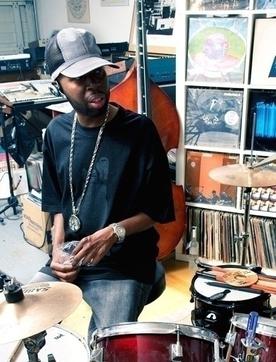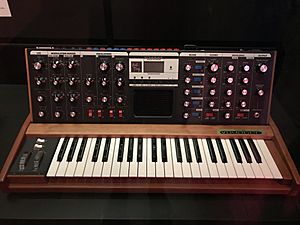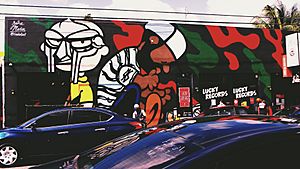J Dilla facts for kids
Quick facts for kids
J Dilla
|
|
|---|---|

J Dilla in 2004
|
|
| Background information | |
| Birth name | James Dewitt Yancey |
| Also known as |
|
| Born | February 7, 1974 Detroit, Michigan, U.S. |
| Died | February 10, 2006 (aged 32) Los Angeles, California, U.S. |
| Genres |
|
| Occupation(s) |
|
| Years active | 1993–2006 |
| Labels |
|
James Dewitt Yancey (born February 7, 1974 – died February 10, 2006), known as J Dilla and Jay Dee, was an American record producer, drummer, rapper, and songwriter. He became famous in the mid-1990s in the underground hip hop scene in Detroit, Michigan. He was a member of the group Slum Village and also part of the Soulquarians, a music group active in the late 1990s and early 2000s.
J Dilla passed away at age 32 due to a serious illness. Even though his life was short, many people see him as one of the most important producers in hip hop and popular music. His music helped raise the artistic level of hip-hop production in Detroit. He was known for making long, melodic loops with cool drum beats and vocal samples. This helped instrumental hip hop become more musically complex.
Contents
Biography
Early life and musical beginnings
James Yancey grew up in Detroit, Michigan. His family lived on the east side of Detroit. His parents were both musical. His mother, Maureen "Ma Dukes" Yancey, was an opera singer. His father, Beverly Dewitt Yancey, played jazz bass. James's mother said he could "match pitch perfect harmony" even before he could speak.
James loved many types of music, especially hip hop. At Pershing High School, he became friends with T3 and Baatin. They all loved rap battles and later formed the group Slum Village. James also started making beats using a simple tape deck. As a teenager, he spent a lot of time alone in his basement. He taught himself to produce beats using his growing record collection.
Starting his career in music
In 1992, James met Detroit musician Amp Fiddler. Amp let James use his Akai MPC, a special music machine. James quickly became very good at using it. Amp Fiddler later introduced James to Q-Tip from the group A Tribe Called Quest. James gave Q-Tip a demo tape from Slum Village.
In 1995, James and MC Phat Kat formed a group called 1st Down. They were the first Detroit hip hop group to sign with a major record label. However, the deal ended after just one song.
Also in 1995, James recorded music with a group called 5 Elementz. In 1996, he formed Slum Village and recorded their first album, Fantastic, Vol. 1. When it came out in 1997, it quickly became popular in Detroit. Many people compared Slum Village to A Tribe Called Quest, but James felt uncomfortable with that comparison.
By the mid-1990s, James had produced and remixed songs for many artists. These included Janet Jackson, The Pharcyde, De La Soul, and Busta Rhymes. Many of these songs were released under the name the Ummah. This was a production group with James, Q-Tip, and Ali Shaheed Muhammad. Later, Raphael Saadiq joined them. James received songwriting credit for his work with the Ummah.
Becoming a performer
In 2000, Slum Village released Fantastic, Vol. 2 on a major record label. This helped James gain more fans as both a producer and a rapper. He was also a founding member of Soulquarians, a group of producers and musicians. This brought him even more attention. He then worked with artists like Erykah Badu, Talib Kweli, and Common. He helped a lot with Common's popular album, Like Water for Chocolate.
In 2001, James started using the name J Dilla. He wanted to make sure people didn't confuse him with another artist named Jermaine Dupri, who also went by "J.D." He then left Slum Village to start a solo career with MCA Records.
In 2002, J Dilla produced an album for Frank-N-Dank. He also worked on his own solo album. However, neither of these albums were officially released. J Dilla was disappointed that fans couldn't hear the music. Around this time, he also helped singer Bilal with his album Love for Sale. Bilal said J Dilla had a special way of making drum beats.
J Dilla signed a solo deal with MCA Records in 2002. Even though he was known more as a producer, he decided to rap on his album. He wanted other famous producers like Madlib and Pete Rock to create the music for him. But this album also faced delays and was not released due to changes at the record label.
While his MCA record was on hold, J Dilla recorded Ruff Draft. This album was released on vinyl by a German label. It wasn't a huge success, but from then on, his music was often released by smaller, independent record labels.
Later life and passing
In 2002, J Dilla started working with producer and rapper Madlib. They formed a group called Jaylib and released an album called Champion Sound in 2003. In 2004, J Dilla moved from Detroit to Los Angeles. He went on tour with Jaylib in the spring of 2004.
From 2003 onwards, J Dilla's health caused him to lose a lot of weight. In 2004, he had to confirm publicly that he was ill. Even though he released less music in 2004 and 2005, his fans still loved his work. Many of his unreleased "beat tapes" (raw music ideas) were shared online.
Magazines like URB and XXL wrote about his health issues and hospital stays. But J Dilla tried to play down how serious it was. In November 2005, the public learned how sick he was when he toured Europe performing from a wheelchair. It was later shared that he had a rare blood disease called thrombotic thrombocytopenic purpura and also lupus.
Near the end of his life, J Dilla spent most of his time in the hospital. This led to financial difficulties because of his medical care. His mother, Maureen Yancey, said she was paying a lot of money each month.
J Dilla passed away on February 10, 2006, at his home in Los Angeles, California. This was just three days after his 32nd birthday and the release of his last album, Donuts. His mother said he died from cardiac arrest.
Musical style
J Dilla used a special machine called an Akai MPC3000. He turned off a feature called "quantize," which usually makes music perfectly on beat. By doing this, he created his unique "off-kilter" (slightly off-beat) style. Before J Dilla, most music used either a straight or "swung" rhythm. J Dilla mixed both styles, creating a new and interesting rhythm that changed how music sounded.
Music released after his death
When J Dilla passed away, he had many music projects planned. According to T3 from Slum Village, J Dilla had about 150 unreleased beats. Some of these were used on Slum Village's album Yes! in 2015.
His album The Shining was mostly finished when he died. It was completed by Karriem Riggins and released in 2006. His album Ruff Draft was re-released in 2007 with extra music.
Other projects released after his death include:
- Sniperlite (2008), an EP with Ghostface Killah and MF Doom.
- Jay Love Japan (2016), which was first released in Japan in 2006.
- Champion Sound (2007), a re-release of his album with Madlib.
- Yancey Boys (2008), the first album by his younger brother, Illa J. J Dilla produced all the songs on this album.
- Jay Stay Paid (2009), an album with 28 unreleased instrumental songs.
- Villa Manifesto (2010), a Slum Village album featuring J Dilla's unreleased music and vocals.
- Rebirth of Detroit (2012), an album that J Dilla's mother helped release.
- The Diary (2016), an album J Dilla recorded in 2002 but was not released until much later.
- No Words (2020), a planned album with Dres of Black Sheep.
Legacy
J Dilla had two daughters. In May 2006, his mother started the J Dilla Foundation. This foundation aims to help people affected by illnesses like lupus.
J Dilla's passing had a big effect on the hip-hop world. Many artists created tribute songs and concerts for him. His death also made more people interested in his music. This helped show how much J Dilla influenced hip-hop production. Questlove, a famous drummer, called J Dilla the "world's greatest drummer." He also said J Dilla "invented the sound we call neo-soul."
The movie Dave Chappelle's Block Party has a special dedication to J Dilla. It says: "This film is dedicated to the life and memory of Music Producer J Dilla, aka Jay Dee (James D. Yancey)."
J Dilla's music has been used in many TV shows. For example, Cartoon Network's Adult Swim played his songs during commercial breaks. A UK mobile company used a Jaylib song in an ad. A BBC documentary about Olympic runner Usain Bolt also featured two of J Dilla's songs.
In February 2007, a year after his death, J Dilla won the PLUG Awards for Artist of the Year and Record Producer of the Year. In his hometown of Detroit, there is a plan to put up a plaque in his honor in Conant Gardens, where he grew up.
After J Dilla's death, his family faced challenges in managing his music and legacy. His mother, Maureen Yancey, wanted to use his legacy to help others, especially those with illnesses or musically talented kids in need. In 2010, an announcement was made about a new administrator for J Dilla's estate and the official J Dilla Foundation. This was to help protect his legacy and support his mother, daughters, and brother.
In 2012, a small street in Montpellier, France, was named "Allée Jay Dee" in his honor. In 2014, Maureen Yancey gave J Dilla's special Minimoog Voyager synthesizer and Akai MPC3000 to the Smithsonian's National Museum of African American History and Culture. These are now part of a music exhibit.
A donut shop inspired by J Dilla opened in Detroit in 2016. His uncle, Herman Hayes, created it to honor J Dilla's legacy. The shop was very popular and sold out quickly on its first day. The book Dilla Time, about J Dilla's life and influence, became a New York Times bestseller in 2022.
Discography
Studio albums
Posthumously released studio albums
Extended plays
Compilations
|
Posthumously released work
|
See also
 In Spanish: J Dilla para niños
In Spanish: J Dilla para niños
 | Audre Lorde |
 | John Berry Meachum |
 | Ferdinand Lee Barnett |



